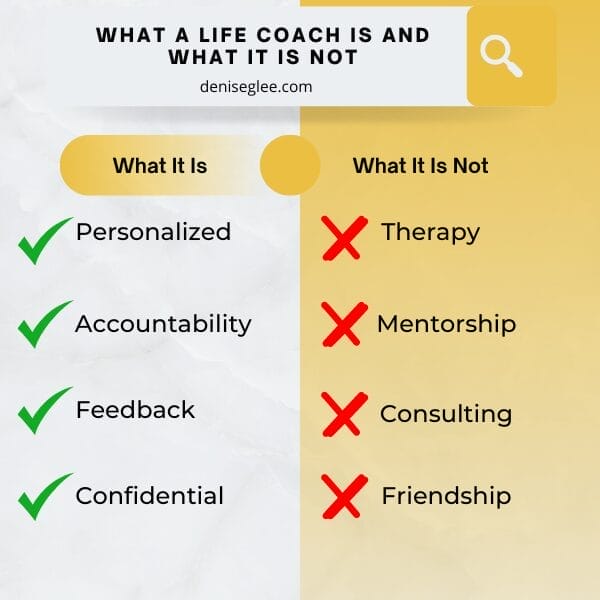
Life Coaching: What It Is and What It Is Not
Hi there, I’m Denise G. Lee, an entrepreneur coach reach their personal and work goals. From what I’ve seen, a good coach can make a big difference in people’s lives and businesses. But not everyone is great at what they do. Some might make big promises but not actually help you get the results you want.
This article is here to help you figure out what life coaching is all about, what it’s not, and how to tell if a life coach isn’t right for you. Understanding these things can save you time, money, and emotional stress.
First, let’s talk about what life coaching is and what it is not. This is important because lots of us get frustrated because our expectations didn’t align with reality.
What Life Coaching Is
Personalized Guidance
A good coach offers personalized guidance tailored to your unique needs. They take the time to understand your goals, strengths, and challenges. For example, if you’re a business owner struggling with time management, a good business and life coach will help you develop strategies that fit your specific situation rather than offering one-size-fits-all advice.
Support and Accountability
Me or any other coach you hire must provide you consistent support and hold you accountable for your progress. Nobody feels confident about their progress if they don’t have a goal to reach towards. This means we regularly check in on your progress, help you stay motivated, and ensure you’re on track to meet your goals. For instance, I always tell my clients about resources and tools that will help improve their business productivity.
Skill Development
Your time in a personal development program like this is designed to help you develop new skills and strategies to overcome obstacles. Whether you need to improve your leadership skills, enhance your communication, or learn better stress management techniques, a life coach can provide the tools and resources you need. For example, your coach might use role-playing exercises to help you improve your conflict resolution skills.

Objective Feedback
A good life coach offers honest, constructive feedback. They actively listen to what you saying and not saying. Also, they help you see your strengths and areas for improvement clearly. This objective perspective can be invaluable, as it’s often difficult to see your own blind spots. For example, a life coach might point out that your delegation skills need improvement and work with you to develop a plan to delegate more effectively.
Confidential and Safe Environment
Because you are talking about sticky and spicy subjects, your service provider must provide you a confidential space where you can openly discuss your challenges and aspirations. This safe environment allows you to explore sensitive issues without fear of judgment. For instance, you might discuss personal fears that are holding you back from taking your business to the next level.
We just talked about what life coaching is. In the next section, we will discuss what it is not so that you have realistic expectations before potentially spending thousands of dollars on a service that may not meet your needs.
What Life Coaching Is Not

Therapy
Life coaching is not therapy. While therapy focuses on healing emotional issues from the past, life coaching is future-oriented and focuses on achieving your goals. For example, if you’re dealing with trauma from childhood, a therapist will help you understand and heal from those past experiences. On the other hand, a life coach works with you on setting goals and pushing through challenges to create a better future.
Therapy focuses on recovery, life coaching focuses on discovery.
Mentorship
Mentors often give advice based on their own experiences, but life coaches guide you in finding your own answers. A mentor might say, “This is what worked for me,” while a life coach will ask, “What approach works best for you?” The idea is to help you gain confidence in making decisions that fit your situation, rather than relying on someone else’s roadmap.
It is common to feel close and connected with someone when you're sharing intimate information. That's what a good confidant does — makes you feel comfortable. But a coach is meant to help you grow and achieve specific goals. Expect them to push you into zones that might not feel comfortable at times.
Denise G. Lee Tweet
Consulting
Consultants provide specific solutions to business problems, while life coaches help you develop your own strategies and skills. And yes, I provide consultation services, but my primary role is as a full-time coach. As a coach, I’ll help you brainstorm and refine your own strategy. Think of it this way: consultants give you the answers, while coaches help you figure them out on your own.
Friendship
It’s normal to feel close to a coach, especially when sharing personal challenges and emotions. A good coach will make you feel understood and supported, just like a friend. However, unlike a friend, a coach’s main job is to push you towards growth.
This might mean encouraging you to step out of your comfort zone and overcoming your fears, which can feel uncomfortable at times. A coach won’t let you stay where you are—they’ll guide you toward where you want to be.
Next, let’s talk about signs of a bad coach. This is an expansion of an earlier article I wrote about this topic.
5 Signs of a Bad Coach

Choosing the right life coach is crucial for your success. Here are some red flags to watch out for:
1. Motivated More by Money than Your Success
- Upfront High Fees Without Clear Explanation: If a life coach demands high fees upfront without providing a clear explanation of their services and the value they offer, this is a red flag. They might be more interested in your money than in helping you.
- Pressure Tactics: Life coaches who use high-pressure sales tactics to get you to sign up quickly may be more interested in your money than in your success. For example, if a life coach insists you must decide immediately or lose out on a “special offer,” they might not have your best interests at heart.
- Lack of Personalization: If their approach feels generic and they don’t take the time to understand your unique needs and goals, they might not be genuinely invested in your success. For example, if you receive the same advice as everyone else without considering your specific circumstances, this is a warning sign.
2. Unclear Expectations
- Lack of Clear Goals: Good life coaches help you set clear, achievable goals. If they can’t articulate their coaching philosophy, that’s a problem.
- Unrealistic Promises: If a coach promises instant results without a realistic plan that that is a clear sign he or she is not trustworthy. How can you tell people they will be a successful with no tangible game plan? Sounds crazy, huh?
3. Control Issues
- Micromanagement: A coach who tries to control every aspect of your life or decisions can be more of a hindrance than a help.
- Lack of Flexibility: Rigid approaches without considering your input or preferences indicate a controlling nature.
4. Prolonging the Process Unnecessarily
- Overemphasis on Duration: If a service provider can’t explain why the process takes time or how the duration benefits you, they might be prolonging the engagement unnecessarily.
- Lack of Progress Tracking: Good coaches should have milestones and progress checks. No clear structure or timeline is a red flag.
5. Lack of Professionalism
- Unreliable: Frequently coming late, leaving early, or canceling sessions last minute shows a lack of commitment.
- Distracted: A life coach who is often distracted during sessions (e.g., checking their phone) is not fully engaged in your development.

Questions to Ask a Potential Coach
Can you explain how your coaching process works and how it’s tailored to individual needs?
What are your expectations for our coaching relationship?
How do you adapt your coaching style to fit individual clients?
Can you explain the typical timeline for your coaching process and why it takes that long?
What is your policy on punctuality and rescheduling?
If you haven’t read it already, check out the FAQ section for my personalized six-month program. I hope you have a clearer expectation on what to expect from your next coach. Next, I will share my final thoughts.
It's a huge win to set clear expectations, be told "no," and face rejection than to be unclear with someone and get dragged into situations that make you curse the day you met them.
Denise G. Lee Tweet
Final Thoughts
Life coaching can really change your life if it’s done well. That’s why it is important to pick a life coach who truly cares about your success, gives you personal advice, and acts professionally. Knowing the signs of a bad life coach can help you make a smart choice and find the right person to help you reach your goals.
If you’re ready to step up your game in both your personal and work life, I’m here to help. As a life coach for business owners, I’m all about helping you be the best you can be.
Also, check out this episode from my entrepreneur podcast where I my thoughts on how to find a coach that will help you succeed personally and professionally.





